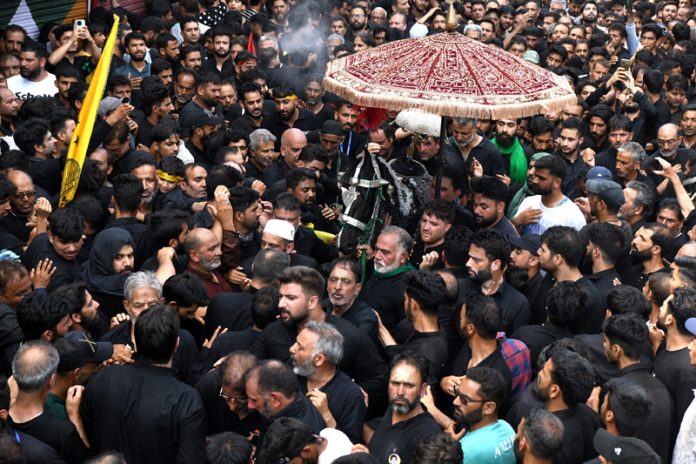
Suhail Bhat
Srinagar, July 17: Thousands of Shia Muslim mourners joined the Zuljinah processions in Kashmir today to observe Yaum-e-Ashura, the 10th day of Muharram-ul-Haram, commemorating the sacrifice of Imam Hussain (AS) and his companions in the Karbala desert in 680 CE.
Click here to watch video
The largest procession took place in the Zadibal neighbourhood of the old city, drawing thousands of mourners. Starting from Botkadal, it moved through several areas before ending late at night at the Imambargah in Zadibal. Mourners displayed banners and chanted slogans honoring Imam Hussain (AS) and his companions, who chose martyrdom over submitting to Yazid, the tyrannical Umayyad ruler.
Follow the Daily Excelsior channel on WhatsApp
Adorned in black attire, mourners, including women and children, walked through the streets of the old city. Many chose to walk barefoot as a mark of respect, while rhythmically thumping their chests and singing elegies in praise of Imam Hussain and his companions. Along the procession route, numerous volunteer groups set up refreshment stalls to keep the mourners fresh and hydrated.
One such stall established in the Zadibal area reflected communal harmony, with members from the Muslim and Kashmiri Pandit communities coming together to serve the mourners. “It used to be a tradition for Kashmiri Pandits to serve mourners during this procession, and after 36 years, I finally witnessed it again,” Subhash, a stall owner from Jammu, said
In the similar gestures exemplifying the deep-seated harmony within the community, water distribution kiosks were set up by several groups belonging to different sects along the procession route. “There is no difference between Shia and Sunni here. The stalls were established to foster and strengthen communal harmony,” a sunni Muslim, Hilal Ahmad, said.
Prior to 1989, the Ashura procession traditionally commenced in Abi Guzar and culminated in Zadibal. For the last consecutive years, the Jammu and Kashmir administration permitted the 8th Muharram procession from Guru Bazaar to Dalgate in Srinagar, lifting a 30-year ban due to initial militancy concerns in 1989.
Throughout Kashmir, including the summer capital Srinagar, all Government and semi-Government offices, banks, schools, businesses, and commercial establishments remained closed. However, there was movement on the roads for both private and public transportation. To ensure a peaceful day, authorities in Srinagar implemented stringent security measures, deploying additional police and paramilitary forces along the procession routes.
“The Jammu and Kashmir Police made elaborate security arrangements for this occasion to ensure the safety of all participants,” said IGP V K Birdhi. He added that traffic regulations were adjusted to facilitate hassle-free movement for mourners, especially children and the elderly.
Divisional Commissioner, Vijay Kumar Bhiduri, said that the administration has already ensured that all facilities were in place so that mourners “do not face any inconvenience, whether it be electricity or drinking water, on this auspicious day.”
The day passed peacefully without any untoward incidents across the Valley. However, the Abi Guzar area, historically the starting point of the Zuljana procession until 1989, faced restrictions with concertina wire and a deployment of police and paramilitary personnel to prevent Shia mourners from initiating the procession route.
In addition to Srinagar, significant processions were held at Mirgund and Bemina in Budgam. Reports indicated similar processions in various districts across Kashmir, including Dangerpora in Bandipora, Delina in Baramulla, Syedpora and Hygam in Sopore, Mirgund, Ahmadpora in Gund Khwaja Qasim, Hanjivera in Pattan, Devsar in Kulgam, Panear in Tral, Sofipora and Wullarhama in Pahalgam, Chattergul and Achabal in Anantnag.
Meanwhile, in the Union Territory of Ladakh, Kargil town witnessed a significant gathering of mourners commemorating Ashura e Hussaini. Under the banners of Jamiat Ullama Isna Asharia Kargil and Imam Khomeini Memorial Trust Kargil, people from adjoining villages joined in mourning processions. Participants in the Azadari procession carried Alam-e-Hussain, recited elegies, and beat their chests in a display of sorrow and reverence for Hazrat-e-Imam Hussain and his companions.
Speakers highlighted the enduring philosophy of Karbala, honoring the Imam’s sacrifice for equality, justice and truth, and his efforts to combat oppression and protect Islam from tyranny in Karbala, Iraq, in the 61st year after Hijra. Special prayers were offered for peace, development, prosperity, and communal harmony in the country. The event concluded with the observance of Zeyarat-e-Ashura.

